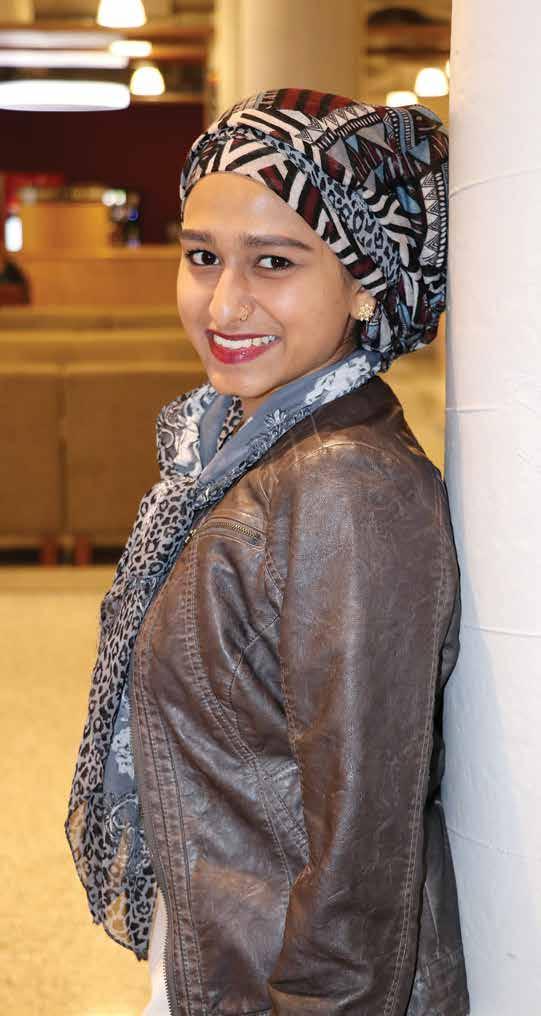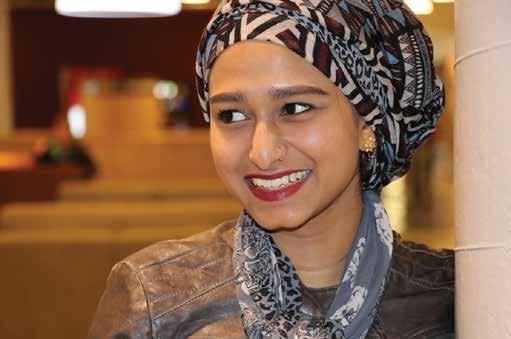
5 minute read
UMD student fights for inclusion on campus
Students for Justice group wants to heal 'toxic' culture
By Kelsey Roseth
When21-year-old Azrin
Awal encounters harassment, she could keep her head down and focus on her studies. When she witnesses racism, she could quietly disapprove and stay silent.
Instead, the University of Minnesota Duluth student chooses to have courage — and speak out loudly against discrimination.
“I want to create a safe space for everyone,” said Awal, who is passionately fighting for inclusion and promoting diversity on campus. “We’re paying too much money to be uncomfortable.”
Racist acts on UMD’s campus
Awal has considered herself an activist for a long time, though things ramped up significantly in April. That’s when two images showed up on Snapchat. They were geotagged to UMD’s story and contained derogatory comments.
One image showed a poster by the Muslim Student Association promoting Hijab Day during Islamic Awareness Week. A comment on the image said, “What’s next … build a bomb workshop?” The other image showed a poster on campus that said “Undocumented, Unapologetic, Unafraid, United we Dream.” A comment on this image asked the question: “Should we call U.S. Immigration and customs enforcement.”
On Snapchat, if someone shares an image taken on UMD’s campus, it can get added anonymously to the university’s online “story.” Images are removed only when someone flags them as offensive, which someone did in this case. Both photos were taken down.
Awal is part of six core organizers behind the unofficial group on campus called UMD Students for Justice, which includes students Farhan Ahmed, Fardowsa Abdinoor, Deiondrea VanDassor, Akquaa Courage Aloh and Ntsang Comfort Aloh. They’re working to make the group official.
As a very vocal member of the group, Awal is leading the charge. “How can the University of Minnesota, or how can any university, say they are preparing their students for their career work if it doesn’t prepare them to work with people of different backgrounds and marginalized groups?” she questioned. The group decided to hold a “Speak Out for Justice” rally on campus to bring awareness to what they call a “toxic campus culture.”
During the rally, an audience of about 60 people listened to a presentation where students and faculty members shared their experiences with offensive comments spoken on campus and microaggressions, which are intentional or unintentional insults that communicate negative messages about people in marginalized groups.
There was a slide presentation during the rally, in which one anonymous student shared a statement saying, “It’s easy to portray us gathered here today as overly-sensitive people who cannot take a joke, but that (ignores) the fact that we hear these ‘jokes’ all the time, and they’re not even funny in the first place. What’s so funny about assuming that someone is violent just because of their faith?”
Another student, who identifies as an individual of color, shared this statement, about the use of the n-word on campus. “You know it's what it means. Why do you keep saying it? You're in college. You've learned about slavery every single
Continued on page 20 school year.”
Also, a UMD faculty member contributed an anonymous report. They went into detail for the presentation about how UMD has failed to invest in opportunities to promote inclusion. “When I moved to UMD, it felt as if I were stepping back in time at least 20 years. UMD has made the conscious choice to not move forward,” the statement said.
“It’s just really frustrating,” Awal said. “It’s kind of heartbreaking to see that.”
During the rally, examples were shared of other offensive actions that took place on campus. One incident included two female students sharing a photo of themselves, possibly in blackface, talking about fried chicken and saying the n-word. Another Snapchat photo showed an African-American doll hanging from the ceiling, and other social media posts formerly shared on the College Republicans at UMD page were offensive to Awal and her peers.
“Everything I do ties back to my struggles,” she said. “I think of how important it is for our country to have so many different identities and perspectives … that’s what makes policies great.”
As part of the “Speak Out for Justice” rally,
Awal created a “Call for Change” at UMD petition, which stated “UMD students, staff, and faculty are demanding change at the University of Minnesota-Duluth immediately! We refuse to sit back and be in compliance with a culture that supports hate speech, a false sense of security, discrimination, and racism towards any group of students, staff, and faculty.” More than 100 people have signed the petition.
A young woman’s journey to activism

Awal’s journey from Bangladesh to the United States began with her father, who received a citizenship lottery years ago. He was invited to live here in an effort to generate diversity within our borders. Out of the millions who applied, Awal said, only a few hundred were granted citizenship. “That’s why I’m so passionate about giving back to my community,” she said, going on to mention her personal motto: service above self.
“I have been given an opportunity that I should be extremely grateful for, because other individuals weren’t given that opportunity back where I am from,” she said. Today, Awal identifies herself as a Muslim Bengali Asian American woman. “I came here when I was 3 years old, and I made America my home and part of my identity.”
The fourth-year student, who grew up in Maple Grove, Minn., is doublemajoring in public health promotion and education as well as psychology, and minoring in communications and women’s studies. She also dedicates significant time to UMD’s Multicultural Center, serving as an ally for others, and works around campus to help individuals understand marginalized communities.
“It hurts,” she said, pausing to gather her thoughts. “When moments like these happen, when incidents like these happen, you become speechless, but you’re not shocked … These microaggressions and these forms of racism, even like xenophobia or Islamophobia, is stuff we have to deal with on a daily basis,” she said.
As a Muslim, Awal said she regularly experiences the racism and microaggressions regarding her religion. She said much of it boils down to the events of Sept. 11, 2001. “I think 9/11 really did change everything,” she said. “(That’s) when everyone was grieving for their country and their brethren. But on the twelfth? Every Muslim family had to justify our love for our country.”
Working to change campus culture
Today, Awal and a few other students are working to combat racism on campus, working with UMD and its chancellor, Dr. Lendley C. Black. The university did not respond to requests for a comment on this article, though Chancellor Black addressed the initial events with a letter to campus students and staff. “Over the weekend, there were several expressions found on social media and geotagged from UMD that fall short of our values and goals. We want you to know that we are aware of these incidents, along with others. We are tracking them and we are doing what we can to mitigate their harmful impact,” the statement said. The university’s policy on racial and ethnic harassment states that “the University is committed to achieving excellence through equity and diversity. A diverse student body enhances the academic and social environment for all students and prepares students to thrive in an increasingly diverse workforce and society.” It also states that it prohibits discrimination and provides information on UReport, a tool to make anonymous complaints online. D







